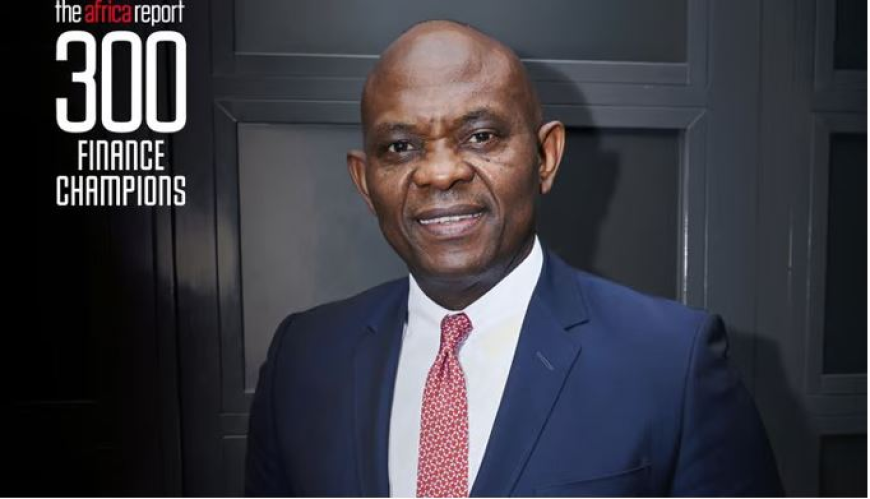Tony Elumelu on Building chaebols, UBA’s global expansion, and Africa’s future growth

Tony Elumelu, the ever-kinetic proponent of Africapitalism, advocates for wealth- building within Africa and a forward-looking approach to development. “In the 21st century, we should not blame others for our state of development as a continent; we must stand and be counted,” he says, emphasising self-reliance.
In late August, he met with Senegal’s new president, Bassirou Diomaye Faye, someone who has his own perspectives on the colonial experience. Shortly after, he joined Aliko Dangote in Kigali, Rwanda, to promote an African Renaissance with other Africa business leaders. On 24 September, he will celebrate 40 years of United Bank for Africa (UBA) operations in the United States.
Dangote in Kigali to promote an African Renaissance with other Africa business leaders. On 24 September, he will celebrate 40 years of United Bank for Africa (UBA) operations in the United States.
From his Lagos home, Elumelu unspools his expanding empire: the consolidation of UBA during Nigeria’s banking reform in 2006, the acquisition of Transcorp in 2011 – which included the licence to operate the Abuja Hilton – and the growth of Heirs Holdings into a major investor in the energy and health sectors.
In 2021, he purchased a 20,000-barrel-per-day joint venture from Tota lEnergies, Shell
and ENI. “Today, we produce 46,000 barrels of oil a day,” he says, generating substantial daily revenues.
The 2024 listing of the Ughelli power project on Nigeria’s stock exchange was a
significant achievement. Supplying a third of Benin’s electricity, the utility’s value surpassed a billion dollars on its first trading day.
Reflecting on national growth, Elumelu mentions President Olusegun Obasanjo’s early 2000s vision for Transcorp to become a Nigerian ‘chaebol’ akin to South Korea’s conglomerates like Samsung. He asserts that Nigeria’s economic vitality results from deliberate government actions, highlighting liberalisation efforts by President Ibrahim Babangida in the 1990s and Obasanjo’s subsequent banking reforms.
While acknowledging the inevitable challenges of failures and corruption in
privatisation, Elumelu remains steadfast. “Yes, it will be painful. It doesn’t mean that you shouldn’t do it,” he says.
TAR: What does having a US banking licence bring to UBA?
UBA is the only African bank that has a federal licence to operate in the United States. It’s not easy: the US has the toughest regulatory standards. You know, before the Patriot Act in 2001, a few African banks were in the US, but once it was introduced, others left. We remained because of our governance standards.
![]() Africa needs more than $100bn annually to address our infrastructure deficit. We’re happy to intermediate those financing flows. The US is the financial headquarters of the world, but we also operate in the United Kingdom, the United Arab Emirates, and we’re expanding in France to cover the European Union.
Africa needs more than $100bn annually to address our infrastructure deficit. We’re happy to intermediate those financing flows. The US is the financial headquarters of the world, but we also operate in the United Kingdom, the United Arab Emirates, and we’re expanding in France to cover the European Union.
You also bank the United Nations from the US?
Yes, we do. We bank institutions from the development world – the United Nations agencies and the rest. They want a reliable, solid financial institution with footprints across Africa and high levels of governance. So, from the comfort of your office in
America, Japan or Europe, you can send money to people in Maiduguri, Kano or Lagos using our digital platforms.
Nigeria’s Access Bank opened a Paris branch, using its London office. Is that something you’re planning to do?
We would have done so, but now the UK is no longer part of the EU, so we can’t just passport services. So we’re obtaining a French banking licence – it’s progressing very well; President [Emmanuel] Macron has been saying: “I want you to open!”
How does your Francophone and Anglophone presence drive the African Continental Free Trade Area (AfCFTA) agenda?
It’s so critical. The challenge we’ve had is that intra-Africa trade is poor – less than 12%. We need to increase and improve this strongly. Africa needs to trade among itself. I was in Benin two days ago for three reasons. First, to see our UBA operations – new branches, how they’re attending to customers – and I was satisfied. Second, to see
Benin already has business in three other African countries.
Will you open subsidiaries in other African countries?
Indeed, we can’t stop at 20 countries. Our ambition is to be in every African country. [To get there] we’re opening up the ownership of UBA to all Africans; currently, it’s mainly Nigerians and foreign investors.
We want more African participation. After the UN General Assembly, we’ll be in Uganda for an investor roadshow. Because the AfCFTA isn’t just about trading; the software you need to orchestrate and drive trade is the financial system. That’s why we want to open UBA up to more African ownership
What's Your Reaction?









































































